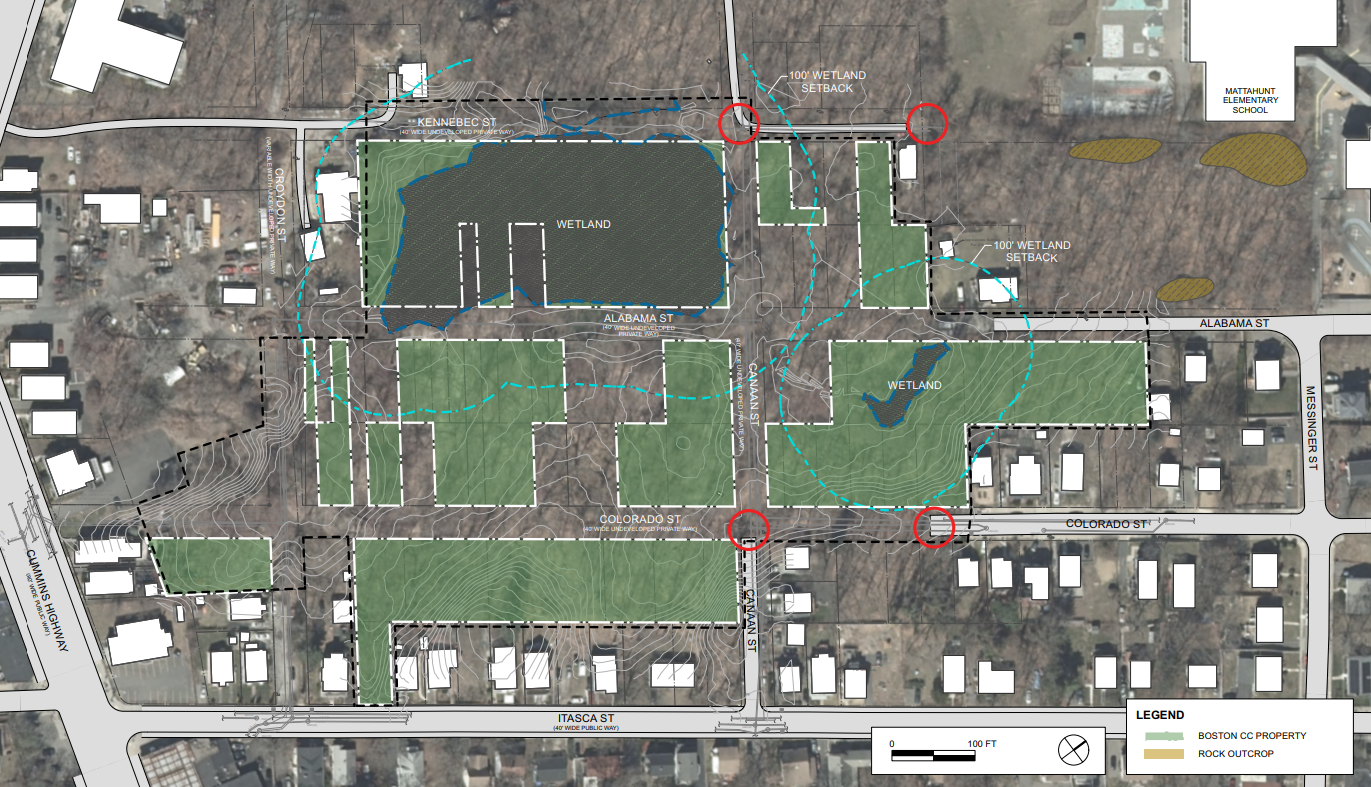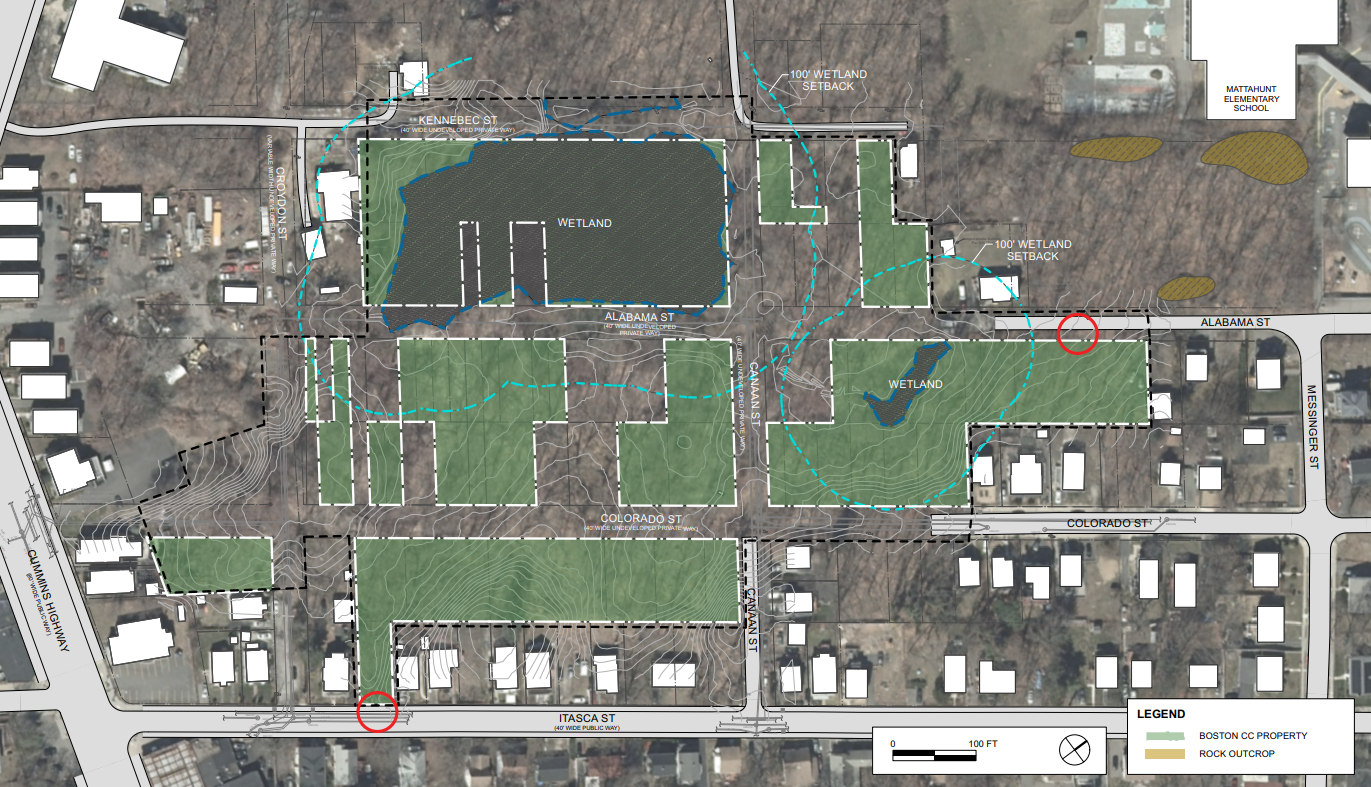Improvements to Mattahunt Woods
The City of Boston is working on a capital restoration project with site access improvements in Mattahunt Woods Urban Wild.
Mattahunt Woods comprises over eight acres of secluded forested wetlands in Mattapan. The site provides important wildlife habitat and native vegetation, and mitigates the impacts of stormwater runoff. Site restoration and trail construction began in Summer 2024 in partnership with the Office of Green Infrastructure, Parterre Ecological, and PowerCorps Boston.
4/28/2025 UPDATE: As of April 2025, the project is in the final phase of construction. We anticipate Mattahunt Woods will reopen to the community in late summer 2025 (July or August). Email Catherine McCandless at catherine.mccandless2@boston.gov to be added to a mailing list for updates about a reopening celebration!
SPRING 2025 COMMUNITY CLEAN-UP
In advance of the Mattahunt Woods Urban Wild's reopening later in the summer, join the City for a spring community clean-up event and a preview of the restoration project’s progress.
- WHEN: Saturday, June 7, 2025 from 10:00 a.m. - 12:00 p.m.
- WHERE: Mattahunt Woods Colorado Street Entrance: 199 Colorado Street, Mattapan, MA 02126
- WHO: All are welcome!
- WHAT TO WEAR: Comfortable close-toed shoes, pants, clothes that can get dirty, a hat that provides shade
- WHAT TO BRING: Bug spray, sunscreen, water
Gloves, tools, and snacks will be provided.
Project Goals
- Remove hazardous trees and invasive species and increase native vegetation
- Preserve and enhance on-site wetlands
- Create a trail system throughout the property
- Improve site access and wayfinding/signage
- Enhance the connection of the property to the nearby Mattahunt Elementary School
Community Open Houses
The second community open house was held on Wednesday, September 13, 2023, from 6 - 7:30 p.m. During this virtual meeting, the project team shared project updates, presented the final design for the site, collected feedback, and discussed next steps for the remainder of the project.
Download the presentation:
View the meeting recording:
The first community open house was held on Tuesday, May 2, 2023, from 6 - 7:30 p.m. During this virtual meeting, the project team shared information about the project process, the existing conditions, and site improvement opportunities, and collected community feedback.
Download the presentation:
View the meeting recording:
NOTICE OF INTENT
After a year-long design and community engagement process in 2023, a Notice of Intent (NOI) was filed with the Boston Conservation Commission and approved at the April 3, 2024 public hearing. The NOI includes a project narrative and final plans for the site restoration, trail network, and entrance enhancements.
PAST EVENTS
VIRTUAL OFFICE HOURS
Wednesday, May 10, from 12 -1 p.m.
Residents joined City staff on Zoom for virtual office hours to ask questions about the Mattahunt Woods Urban Wild Restoration Project.
COMMUNITY SITE WALK
Saturday, May 20, from 10 - 11:30 a.m.
Residents joined the project team for a site walk at Mattahunt Woods to learn more about the existing conditions and discuss improvement opportunities.
MATTAPAN COFFEE HOUR
Thursday, June 8, from 9:30 - 10:30 a.m.
City staff tabled at Mayor Wu's Mattapan Coffee hour at Hunt Playground/Almont Park to share information about the project and collect feedback.
FREQUENTLY ASKED QUESTIONS
FREQUENTLY ASKED QUESTIONSThe City of Boston manages and takes care of 29 urban wilds across Boston’s neighborhoods comprised of 176 acres. These urban wilds offer natural space for passive recreation and serve as outdoor classrooms for children and adults to learn about nature. They also provide habitat to native plants and animals.
The Mattahunt Woods Urban Wild is owned by the Boston Conservation Commission and maintained by staff from the Parks Department’s Urban Wilds Program.
Mattahunt Woods is approximately 8 ¼ acres of secluded forested wetlands in Mattapan.
The Mattahunt Woods Urban Wild was permanently protected in 2008 through a citizen petition.
Urban parks can include both active and passive recreation. Urban parks can include different types of uses, such as playgrounds, athletic fields, public squares, and more. Urban parks can host events and programs, such as fairs, markets, cultural events, music, fitness programs, theater, sports, and more. Urban parks typically include electrical, lighting, plumbing, and irrigation systems.
Urban wilds showcase Boston’s natural features, such as rivers, ponds, woodlands, wetlands, meadows, and rock outcroppings. Urban wilds support plants and wildlife habitats. Urban wilds allow only passive recreation, such as walking, hiking, and nature observation, environmental education, etc. Urban wilds do not include electrical, lighting, plumbing, and irrigation systems.
The scope of this project includes:
- Remove hazardous trees and invasive species and increase native vegetation;
- Preserve and enhance on-site wetlands;
- Create a trail system throughout the property;
- Improve site access and wayfinding/signage; and
- Enhance the connection of the property to the nearby Mattahunt Elementary School.
The project is led by the City of Boston Environment Department and the Boston Parks and Recreation Department. The project team includes staff from the Climate Ready Boston initiative, the Boston Conservation Commission, and the Urban Wilds Program. The project team also includes landscape architects and designers from Crowley Cottrell Landscape Architecture.
Community Outreach:
- Issue a community survey to collect information and feedback (closed in May 2023).
- Distribute flyers to residential abutters of the property to advertise community meetings and events.
- Post about community meetings and events via the City of Boston’s website, social media channels (Twitter, Instagram, Facebook), the Environment Department’s newsletter, local newspapers, and the project website.
- Seek outreach support from:
- Mayor’s Office of Neighborhood Services’ Mattapan Liaison;
- Greater Mattapan Neighborhood Council;
- Mattapan neighborhood associations;
- Mattahunt Elementary School; and
- Mattapan residents.
- Notify City Councilors about community meetings and events.
Community Engagement:
- Two virtual open houses:
- Open House #1: May 2nd, 2023
- Open House #2: to be scheduled for Summer 2023
- Virtual Office Hours on May 10, 2023
- Community Site Walk on May 20, 2023
- Tabling at Mayor Wu’s Mattapan Coffee Hour on June 8, 2023
- Presentations at neighborhood association and community-based organization meetings upon request.
- Individual meetings with the project team upon request.
All project materials, such as flyers, social media content, and meeting presentations, are translated into English, Spanish, and Haitian Creole. Live interpretation in Spanish and Haitian Creole is provided at the virtual open houses and can be available for other events upon request.
All project materials are uploaded to the project website, including meeting presentations and recordings in English, Spanish, and Haitian Creole.
Visit the project website at boston.gov/mattahunt or email Catherine McCandless (Project Manager) at catherine.mccandless2@boston.gov or Paul Sutton (Urban Wilds Program Manager) at paul.sutton@boston.gov.
Today, portions of Mattahunt Woods contain construction debris, automobile parts, and invasive plants, but there are still healthy plant communities and wetlands. There is a perpendicular trail through the property on Canaan Street and Colorado Street. Site entrances are not clearly marked and there is no signage on the property to direct visitors or provide education.
There are four entrances to the property, as marked with red circles on the map below.
- Canaan Street East Entry;
- Canaan Street West Entry;
- Colorado Street Entry; and
- Mattahunt Elementary Entry.
The project will explore adding new entrances at Alabama Street and Itasca Street, as marked with red circles on the map below. The project seeks to create a trail network of gravel pathways and boardwalks connecting all entrances.
Currently, the project area is not accessible for wheelchairs and walkers. The project will explore opportunities to enhance accessibility for people of all ages and abilities.
Yes, the project will add new signage. This will include informational signage at site entrances about property use rules and educational signage throughout the property specific to the Mattahunt Woods Urban Wild.
The project will explore adding benches to entrances and in appropriate locations within the property. The project will not add lighting since the property is an urban wild and lighting can disturb wildlife. The project will not add trash cans because the City’s policy is that visitors to urban wilds must “carry in and carry out” trash. The project will not add security cameras because urban wilds do not include electrical infrastructure. The project will explore adding bike racks where appropriate.
There are sub-grade sewer and stormwater drain lines located within the Mattahunt Woods Urban Wild and beneath several surrounding roadways. There are no electrical, lighting, plumbing, and irrigation systems within the property.
Members of the community identified many types of wildlife at the Mattahunt Woods Urban Wild, including squirrels, chipmunks, turkeys, coyotes, deer, raccoons, and multiple species of birds.
Urban wilds and wetlands provide many environmental benefits, such as storing floodwater (coastal, riverine, and precipitation-based flooding), filtering stormwater run-off, producing oxygen, improving air quality, and reducing the “urban heat island” effect.” They provide habitat for plants and animals and passive recreation for people to enjoy nature.





